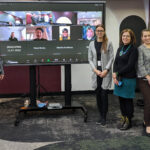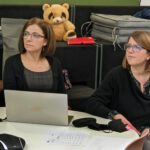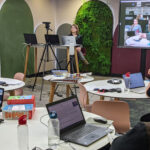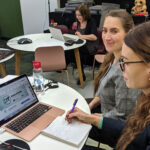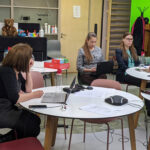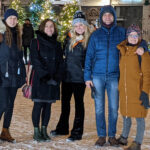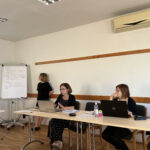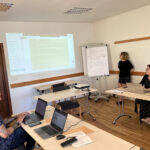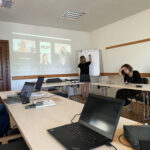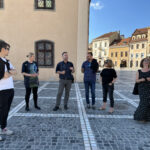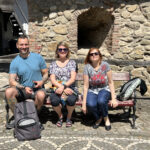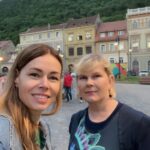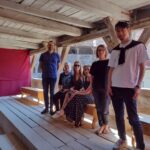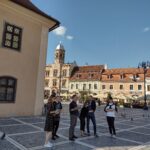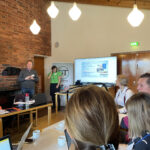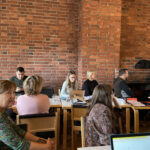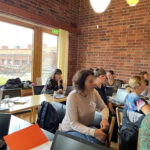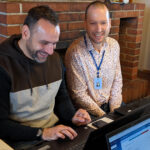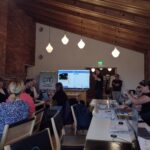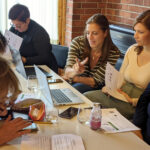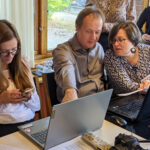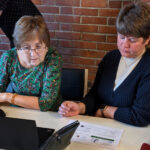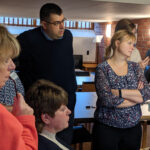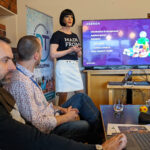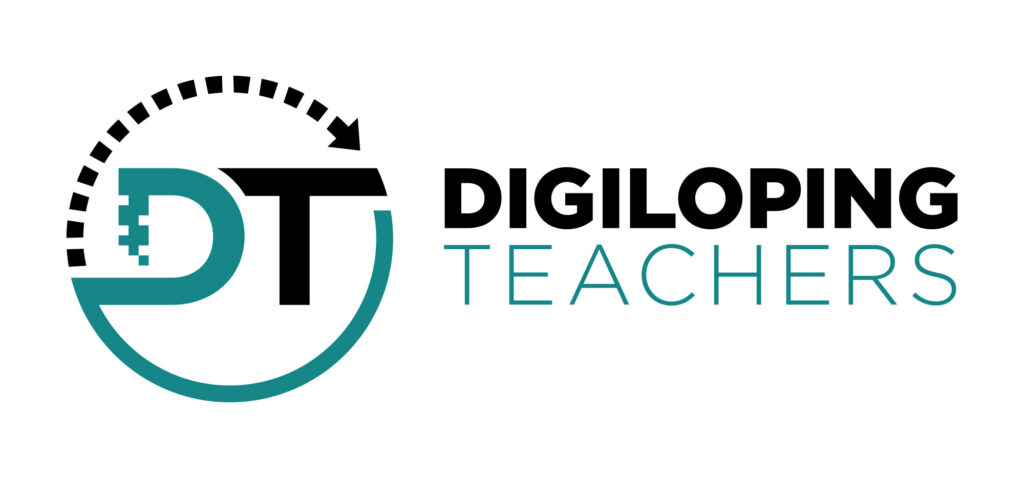
![]() Project duration 01.05.21-30.04.23
Project duration 01.05.21-30.04.23
Erasmus+ DIGILOPING TEACHERS - digital competences development and mentoring for teachers
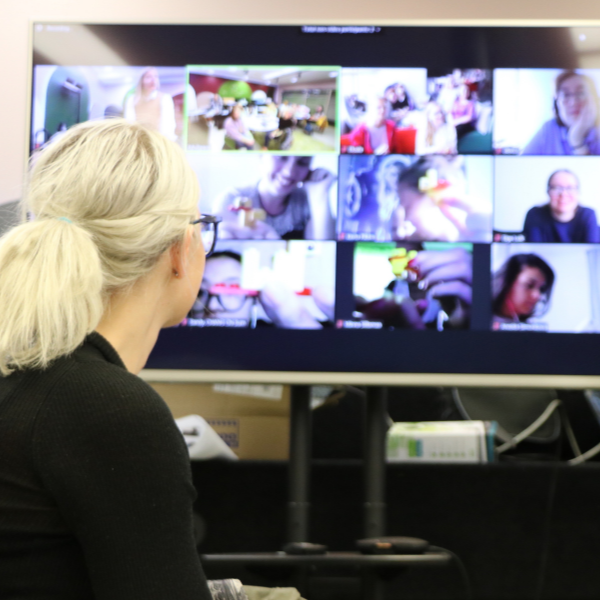
With “Digiloping Teachers” program the goal was to help the digital transition from multiple angles. We addressed the three major groups in the learning process: teachers, students, and schools.
In the project we developed a comprehensive solution that gives the participants of the learning/teaching process (teacher, student) a helping hand to develop digital competence, to promote the development of a digital resilient society. We collaborated to design a converging curriculum focused on learning and teaching 21st-century skills at schools. Sharied content on online platforms in every country and training educators in its curricular methodology.
Project meeting in Tallinn 12-13.01.2022
We spent two busy days with our Estonian partner at Tallinn University for our first on-site transnational project meeting of Digiloping Teachers. Unfortunately, our partners from Finland could not be physically present due to the strict epidemiological restrictions there, but the fantastically equipped EDUSPACE Lab allowed us to hold a professional hybrid project meeting. The hybrid meeting was facilitated by laptops, a giant projector, surround microphones, special cameras that can be easily moved, a room equipped for hybrid education with a presentation corner.
Of course, the two days were not only about minus 20 (such was the weather for the Finns, who showed the harsh winter from different camera angles), but also about the development of the Digiloping Teachers programme and further work. Our topics were like the promotion of the programme, the involvement of teachers and university students in the elaboration of digital competence development training, and the building of the Digiloping Teachers e-learning platform. All partners are committed to developing a truly effective, useful, practical training material that can respond to the digital challenges of Hungarian and Transylvanian teachers but can also be used in Estonian and Finnish teacher training.
Of course, after/between long and sometimes very exhausting professional discussions, we tried out all the gadgets, VR glasses, robots that were available in the lab. Who’s favourite was what was questionable. The VR glasses were the biggest hit with the Hungarians, while Csilla from Spektrum Education Centre preferred to try the calmer, quieter robots and coding gadgets. Admiring the arsenal of tools on display, we wondered how great it would be if at least some of them could be introduced into Central and Eastern European education, as they could help teachers develop algorithmic thinking, problem-solving, drawing skills, digital competencies, not to mention the fun and games that such tools can bring.
Project meeting in Brasov 7-8.06.2022
Another project meeting took place in Brasov, Romania. It was once again a hybrid meeting, which allowed all project members from Romania, Hungary, Finland and Estonia to participate in the meetings.
This time the topics of the meeting were mutual evaluation, team work and mentor guide brainstorming - what does it take to become a mentor? We also discussed what the coaching skills should be and how to spread the project. Materials already developed by each partner were also presented. Finally, we discussed administrative topics.
During two concise days, the project partners showed their dedication and hard work, and to sum up, it can be said that the face-to-face meeting in beautiful Transylvania turned out to be very effective and necessary to move forward with the project.
Project meeting in Jyväskylä 26.09.2022
The third and also the last meeting of the project took place at the end of September in Finland, Jyväskylä.
Under the leadership of Dr. Janika Leoste, a workshop was held for the participants on the development of the mentor's manual. Mutual expert evaluation, teamwork and finishing of materials were also discussed. The topic of the evaluation workshop was how can we measure the impact of the course?
An important point of discussion at the meeting were also questions related to the distribution event and, once again, finally, administrative topics.
An active and hardworking day gave the inspiration to finish the project.
Teacher training in Jyväskylä 26.-28.09.22
On the first day of the training, all teachers had the opportunity to introduce themselves and the educational institutions they were associated with. As a homework assignment, the teachers had to find answers to the questions What are our strengths in digital pedagogy? and How do teachers support each other in terms of digital competences? (also reflecting on the mentoring framework and the application possibilities of these frameworks).
Further, teachers already worked in international teams to discuss mentoring in certain areas of the DigCompEdu framework. After lunch, however, they met in their national teams to discuss and make plans for the mentoring they had to do after the training.
The following topics were also important:
How do they pass on what they have learned in this course to their colleagues at home?
What is the most important thing they would like to learn (from Finnish experts and each other) in the next two days?
What should be the focus of observation and what should come in the portfolios of the region that will be developed in international teams over the next two days?
The discussed topics were summarized as a presentation for all teachers participating in the training. The day ended with an explanation of the observation aspect for the working groups of the school visit.
The next training day included the school visits of the participants, where DigComp Edu offers different observational aspects for each group to observe during the school visits. The visits were followed by feedback and the task of creating a portfolio with your group. The second half of the day included workshops: STEM Problem Solving in a Digital Learning Environment Workshop and Hands-on Robotics Workshop with 4Dframe Mechatronics.
The last day of the training included several presentations, discussion rounds and feedback workshops on the topics heard. Finally, the topics of the follow-up tasks of the training were discussed.
Many thanks to the organizers for the exciting training days in Jyväskylä!
![]() Tallinn University project team:
Tallinn University project team:
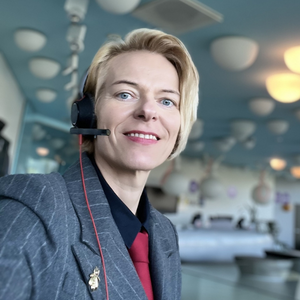
Janika Leoste
Associate Professor
janika.leoste@tlu.ee
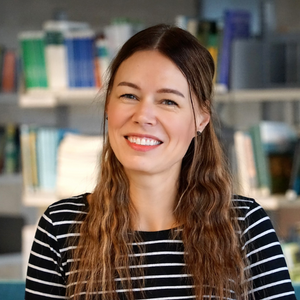
Sirly Väät
Projects Coordinator, Eduspace lab Coordinator
Digiloping project EE team coordinator
sirly.vaat@tlu.ee
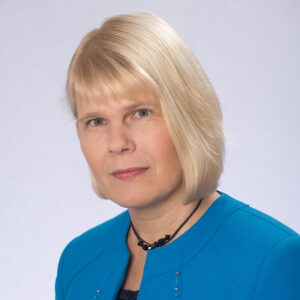
Maire Tuul
Associate Professor of Early Childhood Education
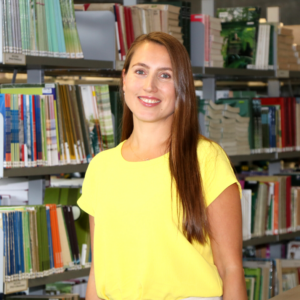
Marika Kutškova
Programme Coordinator


